- Home
- Robert Goddard
Blood Count Page 14
Blood Count Read online
Page 14
By now, taking it easy no longer appealed. Piravani’s note implied it might be many hours before he returned. The prospect of spending those hours in the hutch-like flat with nothing to distract him from the direness of his situation was intolerable. He needed to remind himself of the ease and order that had previously obtained in his life. Then he remembered that he was not far from the Hyatt Regency, which boasted a good restaurant as well as an atmosphere of cosmopolitan sophistication. The walk there would hardly be a pleasure – it was still snowing – but the effort would be well worth it.
Entering the Hyatt Regency was a deeply healing experience for Hammond, a lesson in how reliant he had become on the insulation only money can buy from the harsher realities of the world. Marble and pale wood predominated in the spacious lobby, where neatly uniformed staff attended to the needs of well-dressed guests in an atmosphere of calm efficiency. Water tinkled soothingly in the sunken atrium’s goldfish pond. Subdued swishes and pings announced the comings and goings of the lifts. He could have been in any top-end hotel in any one of several dozen capital cities around the globe. And thus it was possible for him to pretend, for a while at least, that he was not in Belgrade at all.
He sauntered into the Metropolitan Grill, procured a table for one and concentrated as far as he was able on the menu and the wine list. It proved surprisingly easy. Smoked salmon, fillet steak and a good claret were for the present the limit of his needs. With every mouthful he felt more like his old self.
It was an illusion, of course, a surrender by his better judgement to alcohol and haute cuisine. When he left the restaurant at the end of his meal, he was seriously contemplating a cigar as well as a brandy in the bar. But such indulgences were soon to be banished from his thoughts.
A group of people was spilling out of the function suite on the other side of the atrium as he emerged into the lobby. They were almost all male, lounge-suited and Slav-featured. Their flushed faces, loud laughter and back-slapping good cheer suggested a good deal of drinking had already been done. But this did not deter most of them from heading for the bar.
Who saw and recognized who first Hammond could not afterwards have said. All he knew was that he was suddenly looking straight into the smiling eyes of Svetozar Miljanović.
‘Edward! Is it really you?’
‘Good God. Svetozar.’ Hammond forced a grin. ‘Great to see you.’
Miljanović said something in Serbian to his two companions, who ambled on into the bar. Then he clasped Hammond by the shoulder and pumped his hand. ‘What are you doing in Belgrade, Edward? And why didn’t you tell me you were coming?’
Valid questions both, to which Hammond had no ready answers. ‘It’s just a … overnight stop. I’ve been at a … conference … in Athens.’ (Athens? Why had he said that? If Miljanović asked what the conference was about and who was hosting it, he would be sunk.) ‘I thought I’d … take the opportunity to … revisit Belgrade.’
‘You should have told me.’ Miljanović seemed delighted to see him – and reassuringly unsuspicious. ‘How are you, my friend?’ He frowned faintly, as if Hammond’s appearance gave him cause for concern.
‘Oh, a little tired. Otherwise fine. What about you?’
‘Fine also.’ And Miljanović did look well: greyer and marginally more lined than when last they had met, but as lean and sprightly as ever. ‘Are you staying here?’
‘No. The, er … Inter-Continental.’ It was the only other hotel he could name and he felt sure claiming to be a guest at the Hyatt Regency would be a mistake. ‘What have you’ – he gestured towards the function suite – ‘just been to?’
‘Ah. Sledeći Novi Beograd: the Next New Belgrade. It is a consortium that has plans to develop some land around the proposed Metro route to the airport. This evening they have been showing an invited group of businessmen the advantages of reserving space out there – for a big fee, naturally. Lots of CGI and statistics and champagne. The director of the Voćnjak sent me to represent him. The party is just breaking up.’
‘Well, I’d better … leave you to join your friends.’
‘Oh, they are not my friends, though they are so drunk they think they are. I have done my duty. Why don’t you and I go on somewhere? Maybe the bar of your hotel.’
‘I don’t know, Svetozar. The thing is—’
‘You’re right. It’ll be like here – full of businessmen getting smashed. I know a better place. Come. I’ll drive. My car’s outside.’
‘No. I’d fall asleep on you. I really think—’
‘It’s been thirteen years, Edward. One brandy for old time’s sake?’
Resistance, it had become clear, was futile. ‘All right. One drink.’
They fetched their coats and headed for the exit, only to encounter a thick knot of potential tenants of Sledeći Novi Beograd tangled around a tall, bulky, clarion-voiced man wearing a spectacularly well-cut suit made of some shimmering and doubtless very expensive material. He had a mane of jet-black hair that his craggy features suggested could hardly be its natural colour, the impression of vanity this created reinforced by his expression and bearing. The fawning behaviour of those around him suggested they at least believed he had plenty to be vain about.
‘Our principal host this evening,’ Miljanović whispered. ‘Branko Todorović.’
Hammond was glad Miljanović was not looking at him at that moment. He could hardly have failed to notice his flinch of shock and dismay. He fell back half a pace, shielding himself from Todorović’s line of sight.
‘I should thank him. The director would expect it. Excuse me.’
‘Sure. I’ll, er, wait outside.’
Hammond risked a backward glance as he closed fast on the revolving door leading out of the hotel. Miljanović was shaking Todorović’s hand, grinning and nodding as he did so. Todorović responded with a shoulder squeeze and an appreciative smile. Then he looked away. And for a fraction of a second his and Hammond’s eyes met.
‘Are you well, Edward?’ Miljanović asked as he joined him on the other side of the revolving door. ‘You look … I don’t know, not … yourself.’
‘I broke a rib recently, that’s all. You know how doctors are with pain.’
‘Ah yes. Hypochondriacs every one of us. Still, you should go gently. This way.’ Miljanović guided him solicitously towards the car park.
‘A wealthy man, is he, Todorović?’
‘Evidently. He and his backers are throwing money around in the middle of a recession, so … they must have plenty of it. But no one wants to ask them where they got it, believe me. Corruption didn’t end with the war. And a lot of those who got rich under Milošević stayed rich.’
‘Such as Todorović?’
‘Exactly. Once he smuggled petrol. Now he sells the future. Which I must live in. Be grateful you do not need to have anything to do with him.’
‘I have thought of you often over the years, Edward,’ Miljanović said as he steered his modest Škoda out of the car park. ‘Have you … married again?’
‘No. I haven’t.’
‘I am sorry to hear that. A loving wife is the best thing a man can possess.’
‘Have you acquired one yourself?’
‘No. I only tell you what my mother says. My father was the luckiest man in Yugoslavia, according to her. He even managed to die before the country fell apart.’
‘But things are stable here now, aren’t they?’
‘Stable? Oh yes. At least, I guess so. But they’re not how they were when I was young.’
‘You sound like the taxi driver who took me out to the House of Flowers.’
‘Didn’t I take you there?’
‘Yes. You did.’ Damn. A single thoughtless remark was a step into a minefield. ‘I, er … wanted to see it again.’
‘Really?’
‘Is that so strange?’
‘To be honest, Edward, you being here at all is strange. Though I have a theory about why you’ve come.’
&n
bsp; ‘Like I told you, I—’
‘Enough.’ Miljanović patted his arm. ‘When you have a glass of šlijvovica in your hand, I will tell you my theory. Then you can deny it. If you dare.’
‘Dragan Gazi.’
Miljanović smiled wryly as he pronounced the name of their former patient. He had waited until after they had drunk a toast to happier things before unveiling his explanation for Hammond’s presence in Belgrade. They were seated at a corner table in one of the floating nightclubs on the Danube riverside. The choice at this time of the year was limited, but the African Queen was quiet and comfortable, plushly furnished and adorned with black-and-white photographs of bygone Hollywood stars, one of whom, Errol Flynn in the guise of Captain Blood, was freeze-framed in mid-sword-flourish above Miljanović’s head.
‘Before you tell me I am talking nonsense, Edward, let me … elaborate. Gazi is on trial in The Hague. You will have given his trial more attention than most people, because you and I have a … personal interest … in his case. His crimes are terrible, more terrible than I imagined thirteen years ago when I agreed to approach you for help treating him. And we saved his life, did we not, you and I? So, you ask yourself, as I have asked myself: how many people died because we gave Gazi a new liver? He is charged with the murder of several hundred Kosovar Albanians between autumn 1998 and spring 1999, so I guess the answer is … a lot too many. Is that our fault? Are those deaths our responsibility? No. Of course not. We are doctors. We treat the sick even if they are murderers. But, but, but. It troubles you. It troubles me. Maybe if he had not paid us so well, it would be easier. But he did. And we both took his money. Now it … eats at you. Me too. And that is why you have come to Belgrade. There is no logical reason. Gazi is not here. And his victims never were. But your memory of him – your link with his crimes – is here. And so … you have come. Is that not the truth, Edward?’
No. It was not. And yet, as Hammond pondered the point, he realized that in a sense it was. Circumstances had brought him where his conscience might eventually have led. Miljanović’s reasoning was sound, even if misplaced. But revealing why it was misplaced was simply not an option. ‘Yes. You’re right, Svetozar. I suppose that is … what it comes down to.’
‘Well then, my friend, consider this. If Gazi had not killed those Kosovar Albanians, someone else would have. Arkan’s Tigers, maybe. We helped bring Gazi to justice by saving his life. Arkan was gunned down in the lobby of the hotel you are staying in and buried with military honours. He will never be tried. His former followers depict him as a fallen hero. But it will be different with Gazi. When all his crimes have been catalogued and examined, there will be no way for people to call him anything except a mass murderer who deserves to spend the rest of his life in prison. Console yourself with that thought.’
‘Is it consolation enough, Svetozar?’
‘It is for me. It should be for you. Of course, I have the advantage, if that is what it is, of being a Serb. I know from experience that nothing can be perfect. We cannot punish every evil. Peace relies on pragmatism. When we got rid of Milošević, I believed, like a lot of other Serbs, that everything he stood for was finished. But what happened? We elected a prime minister who tried to end the crime and corruption and two years later he was assassinated. Since Đinđić was shot, we’ve all had to be more … realistic. There are rumours that Todorović used to work for Gazi. It’s probably true. But that didn’t stop all those businessmen drinking his champagne and shaking his hand this evening. It didn’t stop me. Do you see, Edward? There are more war criminals in Belgrade than there are in The Hague. But here there are no trials. Only deals and compromises. We cannot run before we can walk. We cannot walk before we can stand up. And we are only just beginning to find our feet.’
‘So, that makes Todorović fireproof, does it?’
‘Yes. It probably does.’
‘I suppose there’s always a chance the International Court will turn up something to use against him.’
‘After all these years?’ Miljanović smiled at Hammond indulgently and shook his head. ‘That, my friend, is too much to hope for.’
‘Are you really leaving tomorrow, Edward?’ Miljanović asked as they emerged from the African Queen an hour later into the cold shock of the wintry night. ‘It is such a short visit.’
‘I have to be at work Monday morning,’ Hammond explained, regretting that he had to go on deceiving Miljanović. ‘And I’ll need Sunday to sort myself out.’
‘There is plenty of work I can offer you here if you want it, though none of the patients pay as well as Gazi. I have lots of liver cases. Far more than thirteen years ago.’
‘Drink-related?’
‘Many, of course. But the big increase I see is in cancer.’
‘Really? Why would that be?’
‘Blame it on the war, Edward. Like everything else. NATO used shells containing depleted uranium in its bombing campaign and their attacks on oil refineries and petrochemical plants released a lot of other toxins into the atmosphere. Factory fires raged for days. The rain turned black. We’re still treating the results of NATO’s “humanitarian” intervention.’
‘I never heard anything about this.’
‘Why would you? We were the bad guys.’ Miljanović laughed.
‘What’s funny?’
‘I was just thinking. All that pollution can’t have done Gazi’s liver any good.’
‘No. But ironically he looked very well when I—’
They stopped. Miljanović peered at him in the darkness, the furrows on his brow dimly lit by the lanterns of a nearby barge. ‘You have seen him?’
‘Well, I … Yes. I went to The Hague, Svetozar. I sat in on his trial for a while. He didn’t speak. He didn’t move much, in fact, and he didn’t see me. It was all rather … anticlimactic.’
Miljanović signified his understanding with a nod. ‘I have thought of going myself. Not just to see Gazi. But to … remind myself what they all did. I sometimes feel I need to. So that I can understand why we really were the bad guys.’
‘You weren’t, Svetozar.’
‘Are you sure? I didn’t stop any of it happening, did I?’
‘How could you?’
‘That’s what we Serbs always say to excuse ourselves. How could we have made a difference? But I sometimes think it’s the wrong question. I sometimes think we should ask: how couldn’t we?’
Miljanović naturally offered to drive him to the Inter-Continental, but Hammond insisted he would prefer to walk. ‘I need to clear my head, Svetozar.’
‘In this temperature, Edward, you will freeze it while you are clearing it.’
‘I have my hat.’
‘OK. Walk then. But remember: you are ignoring a doctor’s advice.’ He gave Hammond a hearty handshake and a rib-jarring hug. ‘Ah, forgive me,’ he said, as Hammond winced. ‘I forgot your injury. And I also forgot to ask how it happened.’
‘It’s a long story.’
‘Was sex involved?’
‘Sadly, no.’
‘OK. You tell me next time.’
‘That’s a promise.’
‘Take care, my friend.’
‘You too.’
Trudging through the snow, which had stopped falling but lay thickly on the pavements and in treacherous slush-filled drifts over the kerbs, Hammond was beset by more guilt than he would have expected to feel for concealing the truth from Miljanović. If only he really had come to Belgrade to salve his conscience. Instead, he was there to shore up his reputation. Good might come of it, in the form of evidence against Todorović that would stand up in court, but his willingness to see Gazi’s ill-gotten wealth bestowed on his undeserving family remained. He wondered whether Alice was the reason for that or just the excuse for it. Was he trying to protect her – or himself? Neither seemed a good enough answer any more.
He had been away from the apartment much longer than he had anticipated. The likelihood was that Piravani would have returned by no
w. Hammond prepared himself for a prickly reception.
It came before he even made it into the block, a horn sounding several sharp beeps as he crossed the car park. Then a pair of headlamps flashed at him and he recognized the van.
Piravani lowered the window and scowled out as he approached. ‘Where the fuck have you been, doctor?’ He did not sound pleased. ‘You locked me out.’
‘I assumed you’d have a key.’
‘I told you to stay in the apartment.’
‘I don’t remember you saying that.’
‘Where have you been?’
‘I had dinner at the Inter-Continental.’ The lie came automatically.
‘Not the Hyatt Regency?’
‘No. Why?’
‘That’s something, I guess. Let’s go in. I’m freezing to death out here.’
Piravani said no more until they were inside the flat. He opened a bottle of beer, took a couple of swigs, then slammed a Serbian newspaper down on the kitchen table. It was printed in Cyrillic script, rendering it doubly unintelligible to Hammond.
‘Today’s Politika,’ Piravani growled. ‘I’ve had plenty of time to take a thorough look through it.’
‘Sorry. I just couldn’t stay cooped up here.’
‘A pity. But at least you chose the Inter-Continental. According to the paper, our friend Todorović was hosting a reception at the Hyatt Regency this evening to launch a property-development project.’
‘So what?’ Hammond’s discomfiture was growing by the second. ‘He wouldn’t have noticed me even if I had gone there. Besides, he doesn’t know what I look like.’
‘How can you be sure of that?’
‘Well, I just … assume he …’
‘You’ve done a lot of assuming tonight, doctor. Do me a favour. Cut it out.’
Hammond sighed. ‘All right. You’re the boss. What did you learn from your visit to Dedinje?’

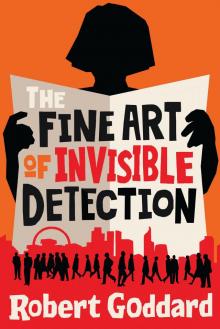 The Fine Art of Invisible Detection
The Fine Art of Invisible Detection One False Move
One False Move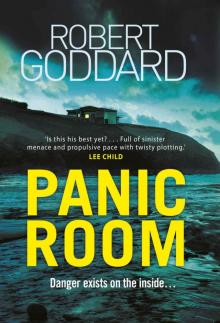 Panic Room
Panic Room Beyond Recall
Beyond Recall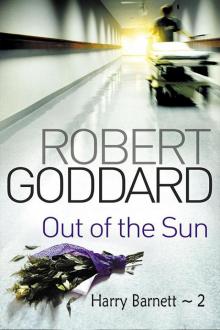 Out of the Sun
Out of the Sun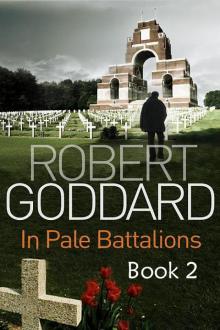 In Pale Battalions - Retail
In Pale Battalions - Retail Painting The Darkness - Retail
Painting The Darkness - Retail The Corners of the Globe
The Corners of the Globe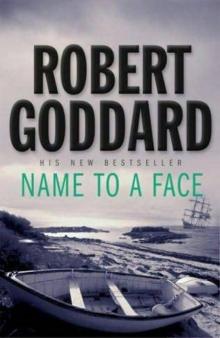 Name To a Face
Name To a Face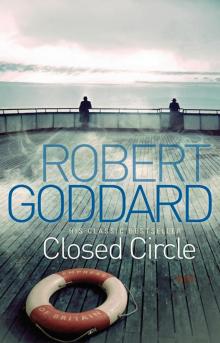 Closed Circle
Closed Circle Caught In the Light
Caught In the Light Into the Blue
Into the Blue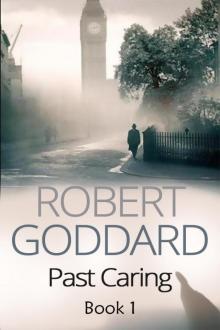 Past Caring - Retail
Past Caring - Retail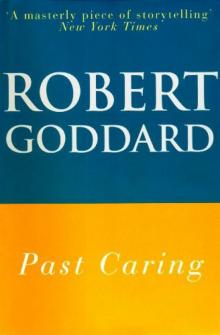 Past Caring
Past Caring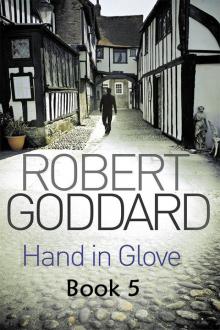 Hand In Glove - Retail
Hand In Glove - Retail Borrowed Time
Borrowed Time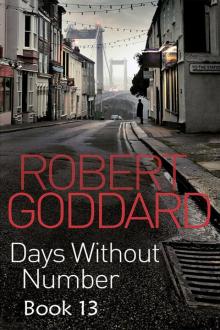 Days Without Number
Days Without Number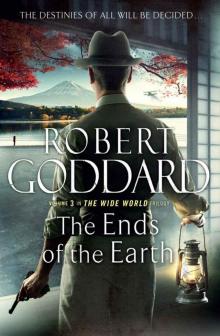 James Maxted 03 The Ends of the Earth
James Maxted 03 The Ends of the Earth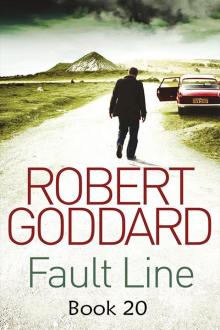 Fault Line - Retail
Fault Line - Retail Play to the End
Play to the End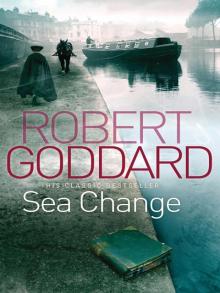 Sea Change
Sea Change Never Go Back
Never Go Back Take No Farewell - Retail
Take No Farewell - Retail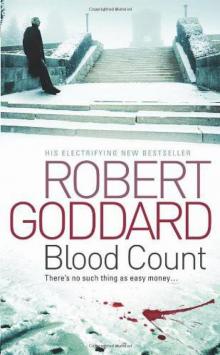 Blood Count
Blood Count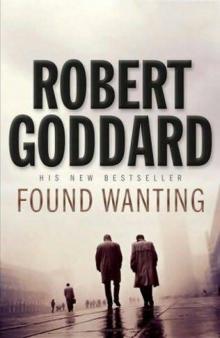 Found Wanting
Found Wanting Sight Unseen
Sight Unseen Hand in Glove
Hand in Glove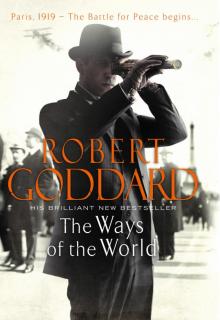 The Ways of the World
The Ways of the World